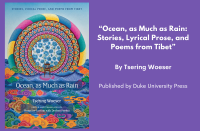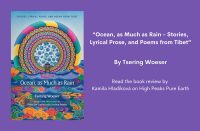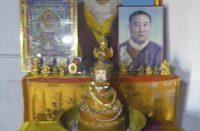
High Peaks Pure Earth has translated a blogpost by Woeser written in May 2014 for the Mandarin service of Radio Free Asia and published on her blog on May 20, 2014.
In this post, Woeser reflects on a Hong Kong blogger called “Grey Reporter” and his views on Tibet. Woeser has previously written on Hong Kong but it must be noted that the post below was written in May 2014, before the “Umbrella Revolution” that was dismantled today started.
My Preface for Hong Kong Journalist Lu Jinghua’s “The Grey Reporter Ponders Over the Current Political Situation”
By Woeser
Four years ago, I came across a blog called “A Grey Reporter’s Words” which contained a number of articles on Tibet. Later on, I published a lot of them on my own blog “Invisible Tibet”. The first one was “Voices from the Frontier – Tibetan Language”; “The linguistic and cultural environment is far more vile for what the CCP terms autonomous ‘minorities’ than for people from Guangzhou”, with regards to this the Grey Reporter wrote: “The logic of absolutism is very simple, since they cannot succeed in transforming you, they colonise you; the sinicisation of Tibet by the Chinese is ‘unavoidable’”. With regards to this point, I believe that precisely because this is the reality in Tibet, and because this has been happening at an ever increasing pace over the past few years, the local authorities will never say or admit this openly.
The Grey Reporter is from Hong Kong. Thanks to the CCP’s special “minority” policies and my own position of being a “minority” among “minorities” because of my Party criticism, there is no hope for me to ever obtain the so-called “Exit-Entry Permit for Hong Kong and Macao”. For me, Hong Kong is still the same as before 1997, a far-away place, almost a foreign country. I will never be able to visit it in person. Actually, I must apologise. This is wrong. The Hong Kong of 1997 was fundamentally different from the Hong Kong today, so much has changed since. It is the same in Tibet, since 1959, “The sky and the earth have been turned upside down”
“Turning the sky and the earth upside down” is the favourite slogan of the Party. According to official discourse, 1959 marks the turning point that divides Tibet into an “old” and a “new Tibet”: the “old Tibet” was hell on earth, it was “the most reactionary, darkest, cruelest, most barbarian” place; the “new Tibet”, on the other hand, is heaven on earth, nature is the epitome of happiness, it is incomparable, totally beyond description. Of course, we all know why the Party persists on this quite absurd version of history and actually keeps embellishing it more and more. The goal is to legalise the occupation at the time and its colonial rule today. And the Party believes: repeat a lie a thousand times and it becomes the truth.
Another article that I liked by the Grey Reporter was “The Fate of the Tibetan Language and Other Things”. He wrote: “The remembering and continuation of the languages of North American indigenous peoples, Noam Chomsky’s critique of the destructive nature of the dominant American cultural discourse, the search for identity among the indigenous Taiwanese population after democratisation, all these are forcefully denounced in countries like China that operate with a strong central culture. Hence, whether indigenous North Americans, African-Americans, Tibetans, Mongolians, indigenous Taiwanese or even Cantonese, they all share ‘the same fate’; under the ‘strong tendency’ of being integrated into and assimilated by some mainstream culture, they realise their own differences and discrepancies and become aware of their own language and culture and attempt to continuously fight against assimilation.”
The Chinese government, however, approaches the Tibetan language and that of other “minorities” in a valiant manner; starting from childhood, they try to rapidly sinicise Tibet and all other “minority” areas. Or to use official wording, they try to integrate them into the mainstream culture. When I was in Lhasa last year, I met friends whose child was denounced as a “bad pupil” by teachers because the child had difficulties expressing themselves in Mandarin. This made him who was fluent in Tibetan feel inferior. I even heard him singing a song, a song that I had also been singing when I was young, “Liuyang River”. Hong Kong people will probably not know it. It is a red revolutionary song, praising Mao Zedong taking over China. I still know how to sing it today, which shows how powerful the brainwashing was back then. I felt incredibly angry and sad when I heard this young Tibetan child singing the following lines, repeating them like a parrot but not knowing what they meant at all: “…who is the man at the river bank? We have produced a Mao Zedong, Leaders we must liberate the country”.
In the article “Chinese Orientalism in Tibet”, the Grey Reporter echoed my own criticism with some Chinese mainstream intellectuals. I have much evidence that many Chinese mainstream intellectuals entertain a kind of nationalist attitude (and this is already mildly put, in actual fact, I would go further and say that they entertain a socialist attitude). Since the protests that have been sweeping across Tibet, these intellectuals have been unanimously criticising that with regards to Tibet, the West entertains a “Shangri La complex” a “Shangri La myth” and that it is a kind of “Orientalism” based on mystification. And this is why after the protests erupted in 2008, the West only stood on the side of the Tibetans. What these intellectuals have not considered is, why after having been “liberated” for so many years, the “emancipated serfs” want to rise and resist against their “liberators”. And why were so many of the protestors born after “liberation”?
The comments made the Grey Reporter were very tolerant. These Chinese mainstream intellectuals who cater to the mainstream attitude in China, are good at using “progressive language” and not the “evil and vicious official language” to argue in favour of Chinese Tibet policies. But they don’t regard Tibetans as the subject, they don’t see the Tibet crisis as a problem of dealing with ethnic minorities and questions of identity, they simply see it as a problems relating to modernisation. The Grey Reporter asked in a moderate way: “Is this because they live inside this autocratic system and say this ‘involuntarily’? Actually, “involuntarily” is not the right word, I think these mainstream intellectuals are extremely smart, they know how to protect themselves and work towards their own interests.
Why does this journalist in the far-away Hong Kong pay so much attention to Tibetan issues and why is he so concerned? Moreover, his concern is not clamorous to catch attention, it is subtle, clear-headed and controlled. I don’t need to repeat the old phrase that “Today’s Tibet is tomorrow’s Hong Kong”, it is so obviously true; the Grey Reporter used the following sentence: “History has proven that the autonomy that the CCP promised Tibet is never genuine, and history will prove that the democracy that the CCP promises Hong Kong will never be genuine, either.” I am not acquainted with the Grey Reporter, apart from a few written exchanges. But these have been limited. We only read each others’ blogs. But we have a lot in common. This is probably because we are both in very similar situations; and there is a more profound reason: just like the courageous “cosmopolitan human being” that the Grey Reporter mentions in his article: “All those who cherish Hong Kong’s autonomy, have the moral responsibility to support the Tibetan struggle.”
This resonates with my good friend, the Tibetologist Elliot Sperling, whose research deals with Tibetan history and Sino-Tibetan relations, but who still pays meticulous attention to the current problems of Tibet policies and human rights questions. He once explained his concern for the Tibet question like this, if we approve of the fundamental value of civil society and defend it, and this is completely unrelated to ethnicity or nationality, we must for this support Tibet in its struggle to fight against its destruction.
What is interesting, only because I was writing this article I was reminded of a question that I had early on: What does “Grey Reporter” actually mean? He replied to me: “Grey refers to age, a journalist who is getting on in years.” As simple as it is, it still exudes a poetic flavour.
May 2014





Follow Us!